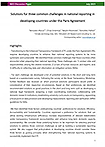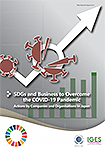 |

 |

| NEWS |
Launch of the Special Webpage: “Enhanced Transparency”

Based on the Paris Agreement’s enhanced transparency framework (ETF), countries regularly provide information on their progress with national climate actions. IGES supports full implementation of the ETF by all countries, especially in Asia. This webpage introduces IGES activities on ETF, such as the Mutual Learning Program for Enhanced Transparency (MLP), among other capacity building activities, and also links to relevant research papers and databases.

 More details available here More details available here |
|
Update to the G7/G20 Special Webpage

The year 2021 will be a milestone for accelerating international efforts on various environmental issues, including climate change and biodiversity. IGES updated its special webpage on the G7/20 with recent publications that provide the latest information and analysis on national and international conferences and actions.

Briefing Note
“Outcome of the 2021 G20 Energy and Climate Ministers’ Meeting: Towards the G20 Leaders' Summit and COP26” (only in Japanese).

Policy Report
“G20 Report on Actions Against Marine Plastic Litter: Third Information Sharing based on the G20 Implementation Framework”

 More details available here More details available here |
|
Platform for Redesign 2020 July News

The Platform for Redesign 2020 was referenced in the joint G20 Climate-Energy Communique, approved by the G20 Ministers in charge of climate and energy issues on 23 July in Naples, Italy.

 More details available here More details available here |
|
| PAST EVENTS |
Workshop: “Innovation from Nature ・ Innovation for Nature”

On 27 July, IGES and the National Institute of Ecology, Korea, co-organised a workshop on innovation and nature. Technological development has changed and improved many aspects of our lives, including the way we conserve nature and its biodiversity. Meanwhile, nature itself is also the source of an increasing amount of technological innovation. Presenters at the workshop shared ideas and research on innovation “from” and “for” nature, and contemplated the way forward.

 More details available here More details available here |
|
High-Level Session and Workshop: “Fostering 1.5 Degrees Lifestyles With Urban Partnerships”

On 22 July, IGES co-organised a High-level Session and Workshop, titled “Fostering 1.5 Degrees Lifestyles With Urban Partnerships”, as part of the ICLEI World Congress. The session focused on the significance of consumption-based strategies, IGES’s work on 1.5 Degree Lifestyles, and a dialogue among experts from the policy arena, academia and the business sector that emphasised the importance of multi-stakeholder collaboration for sustainable lifestyles. The workshop introduced findings from the “Envisioning Future Low-Carbon Lifestyles and Transitioning Instruments” project, led by IGES, in collaboration with project partners from Brazil, India, South Africa and Thailand. Overall, the discussions accentuated the importance of taking a city-specific approach and engaging with citizens to encourage them to choose transition pathways towards sustainable lifestyles. The event was co-organised with the ICLEI World Secretariat and the Hot or Cool Institute (Germany).

 More details available here More details available here |
|
Webinar: “The Health and Climate Imperatives to Address Open Burning of Waste”

On 20 July, IGES co-organised a webinar on the uncontrolled burning of waste which takes place worldwide, particularly in lower-and-middle income countries (LMICs) where waste management systems are often limited in effectiveness or altogether non-existent. Waste is burnt in residential areas and within industrial or commercial premises due to the lack of availability, unreliability, or sometimes complete absence of waste collection and disposal systems. This can lead to a number of public and environmental health concerns, including poor health and premature death. Despite being a widespread practice with global consequences for the climate and for public health, open burning of waste is still considered a local issue and its harmful effects receive little regional or international attention. The purpose of the webinar was to bring greater attention to the issue of burning waste, with speakers discussing why it occurs, risks and consequences, in addition to available solutions.

 More details available here More details available here |
|
HLPF Side Event: “Integrating the SDGs into Business Operations and Supply Chains in Asia and the Pacific”

Achieving the Sustainable Development Goals (SDGs) requires decisive action by many stakeholders, including the business community, and IGES organised a side event at the High-level Political Forum (HLPF) to address this topic on 13 July. Representatives from different organisations shared their experiences on greening operations, promoting social dialogue and decent work programmes, and working to advance sustainable supply chains. One emerging issue was that business leadership must extend beyond marketing slogans or corporate responsibility programmes. It is critical that corporations fully integrate the SDGs into core planning and budgeting processes as well as across transnational supply chains. While there is growing business interest in incorporating the SDGs into internal and supplier operations, knowledge and experience concerning such integration remains limited.

 More details available here More details available here |
|
HLPF Side Event: “Healthy Planet, Healthy People: Role of the Satoyama Initiative for Green and Blue Recovery”

In line with the key theme of the 2021 HLPF, IGES organised a side event on the Satoyama Initiative. It highlighted the role of socio-ecological production landscapes and seascapes (SEPLS) in achieving the SDGs, and how SEPLS can contribute to the achievement of a sustainable and resilient recovery from the COVID-19 pandemic and to the Post-2020 Global Biodiversity Framework.

 More details available here More details available here |
|
| PUBLICATIONS |
 |
Discussion Paper

“Solutions for Three Common Challenges in National Reporting in Developing Countries under the Paris Agreement”

Developing countries often encounter challenges when preparing national reporting (e.g. Biennial Update Reports and national communications), including unclear roles of related ministries, insufficient human resources and difficulties in data collection. This paper sets out some proven good practices that serve as solutions for these common challenges to strengthen countries’ national reporting systems for transitioning to the enhanced transparency framework under the Paris Agreement.
|
|
 |
Policy Report

“SDGs and Business to Overcome the COVID-19 Pandemic: Actions by Companies and Organisations in Japan”

Launched by IGES and the Global Compact Network Japan (GCNJ), this report shows the latest survey results on the actual status of Japanese companies’ efforts regarding the SDGs. Based on survey results from 208 companies and organisations, as well as interviews with their top executives, it discusses changes in business and work styles in light of COVID-19, in addition to basic approaches towards sustainability and expected future initiatives.
|
|
Issue Brief
 “Japan Sustainable Finance Policy Update March 2021-May 2021”
“Japan Sustainable Finance Policy Update March 2021-May 2021”

eLearning Handbook
 “eLearning Course on Cities and Marine Plastic Pollution: Building a Circular Economy”
“eLearning Course on Cities and Marine Plastic Pollution: Building a Circular Economy”

Peer Reviewed Articles
 “Co-designing Workshops on Sustainable Consumption and Production in Southeast Asia: Application of Idea Cards and Structuring Methods” (Sustainability: Science, Practice and Policy) “Co-designing Workshops on Sustainable Consumption and Production in Southeast Asia: Application of Idea Cards and Structuring Methods” (Sustainability: Science, Practice and Policy)

 “Expansion of Policy Domain of Sustainable Consumption and Production (SCP): Challenges and Opportunities for Policy Design” (Sustainability) “Expansion of Policy Domain of Sustainable Consumption and Production (SCP): Challenges and Opportunities for Policy Design” (Sustainability)

 “Integrative Assessment of Stormwater Infiltration Practices in Rapidly Urbanizing Cities: A Case of Lucknow City, India” (Hydrology) “Integrative Assessment of Stormwater Infiltration Practices in Rapidly Urbanizing Cities: A Case of Lucknow City, India” (Hydrology)

 “Leveraging Deep Neural Networks to Map Caribou Lichen in High-Resolution Satellite Images Based on a Small-Scale, Noisy UAV-Derived Map” (Remote Sensing) “Leveraging Deep Neural Networks to Map Caribou Lichen in High-Resolution Satellite Images Based on a Small-Scale, Noisy UAV-Derived Map” (Remote Sensing)

 “Socio-Hydrological Approach to Explore Groundwater-Human Wellbeing Nexus: Case Study from Sundarbans, India” (Water) “Socio-Hydrological Approach to Explore Groundwater-Human Wellbeing Nexus: Case Study from Sundarbans, India” (Water)
|
|
| RECRUITMENT / INTERNSHIP |
| The Research and Publications Unit of the Strategic Management Office (SMO-RP) Internship |
 More details available here More details available here |
 |
 |

